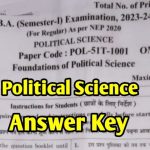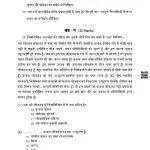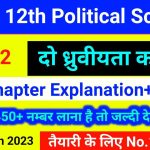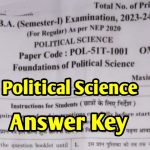Class 12 political science chapter 4 explores the concept of “Executive” in a political system. The executive branch is one of the most important pillars of government. It is responsible for implementing laws and policies.
The chapter covers the role of the executive at different levels, including the President, Prime Minister, and Council of Ministers in India.
In India, the executive is divided into two categories:
- Nominal Executive: The President of India acts as the nominal head of state and has specific constitutional powers.
- Real Executive: The Prime Minister and the Council of Ministers are the real executives who make the decisions and run the government.
The President has powers such as the ability to summon and prorogue sessions of Parliament, appoint the Prime Minister, and declare national emergencies. The Prime Minister, being the head of the real executive, leads the government’s day-to-day functions.
Study Guides
Understanding the functions and powers of the executive is crucial for exams. Key points to study include:
- The distinction between nominal and real executive
- Powers and functions of the President and Prime Minister
- The composition and role of the Council of Ministers
- The relationship between the President and Prime Minister
- Emergency powers and how they can be applied
Textbook Summaries
The chapter provides a detailed explanation of the structure of the executive in India. The President’s role is mainly ceremonial, whereas the Prime Minister holds significant decision-making power. The chapter also explains how the Prime Minister is appointed, the importance of the Council of Ministers, and the collective responsibility they hold in the Parliament.
Flashcards
- Executive: Branch responsible for implementing laws.
- President: Nominal head of state in India.
- Prime Minister: Head of the government and real executive.
- Council of Ministers: Group of ministers assisting the Prime Minister.
- Emergency Powers: Special powers given to the President during national crises.
Class Handouts
- Role of the President:
- Ceremonial head of state.
- Appoints the Prime Minister.
- Signs bills into law.
- Role of the Prime Minister:
- Real head of the executive.
- Leader of the Council of Ministers.
- Responsible for policy-making and administration.
- Council of Ministers:
- Consists of Cabinet Ministers, Ministers of State, and Deputy Ministers.
- Collectively responsible for all government decisions.
Research Notes
Research the evolution of the executive system in India. Initially, the President held considerable power, but over time, the balance has shifted toward the Prime Minister and the Council of Ministers. Compare the Indian system to other countries’ executive branches, such as the United States, where the President is both the nominal and real executive.
Annotated Readings
- Article 52-78 of the Indian Constitution: Provides details on the role and powers of the President and the Council of Ministers.
- Separation of Powers: A principle ensuring that the executive, legislative, and judiciary branches remain independent but work together.
Homework Solutions
Example Question:
- Explain the powers of the President under the Indian Constitution.
Answer: The President of India has several important powers, such as appointing the Prime Minister, calling sessions of Parliament, and declaring a state of emergency. However, these powers are exercised on the advice of the Prime Minister and the Council of Ministers.
Exam Preparation Materials
To prepare for exams, focus on these key areas:
- Understand the difference between nominal and real executive.
- Be clear on the President’s ceremonial role versus the Prime Minister’s leadership role.
- Review the functions and responsibilities of the Council of Ministers.
- Study the emergency powers granted to the President and when they can be invoked.
Lab Reports
Though Political Science doesn’t require lab reports, think of this section as detailed case studies. For example, study how different Prime Ministers in India have managed their roles and influenced the political landscape. Analyze case studies of when emergency powers were used, such as during the national emergency in 1975.
Mind Maps
Here is a simple mind map outline:
- Executive Branch
- Nominal Executive: President
- Ceremonial Powers
- Constitutional Role
- Real Executive: Prime Minister and Council of Ministers
- Decision-Making Power
- Policy Formulation
- Nominal Executive: President
- Emergency Powers
- National Emergency
- State Emergency
Practice Quizzes
- Who is the nominal head of the executive in India?
- (a) President
- (b) Prime Minister
- (c) Council of Ministers
- (d) Parliament
Answer: (a) President
- Which body is responsible for the day-to-day administration of the government?
- (a) President
- (b) Prime Minister
- (c) Supreme Court
- (d) Parliament
Answer: (b) Prime Minister
Sample Problems with Solutions
- Problem: Explain the relationship between the President and Prime Minister in the Indian executive system.Solution: The President of India is the ceremonial head of state, while the Prime Minister is the head of government. The President acts on the advice of the Prime Minister and the Council of Ministers, who hold the real power in decision-making and running the government.
Glossaries or Vocabulary Lists
- Executive: The branch of government responsible for implementing laws.
- Nominal Executive: The head of state with ceremonial powers, such as the President.
- Real Executive: The head of government with actual governing powers, such as the Prime Minister.
- Council of Ministers: The group of ministers that helps the Prime Minister in running the government.
- Emergency Powers: Special powers granted to the President during times of national crisis.






